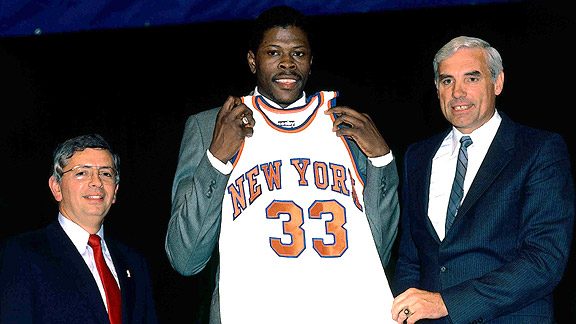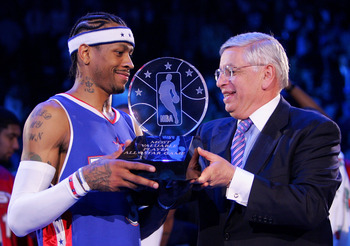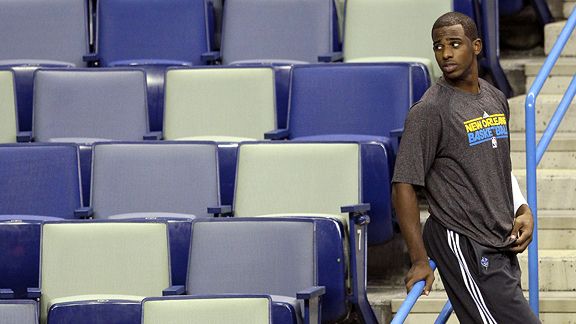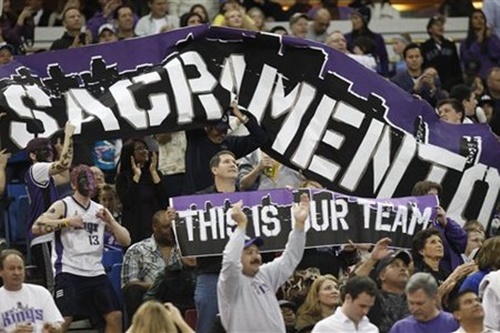
Last night I attended an event billed as Behind the Scenes with NBA Commissioner David Stern. In a theater at the National Museum for the American Indian, I sat among a crowd that seemed to be half over the age of 60 (and Jewish) and half incredibly stereotypical can’t-function-in-public-and-smell-badly nerds. Yeah, it was weird.
Besides moderator Phil Hochberg who would occasionally interject himself, there were four people seated in front of me: Michael Lee, Washington Wizards beat writer; Mike Wise, Washington Post sports writer; Wolf Blitzer, anchor of CNN’s The Situation Room and supposedly the representative of “the fan” on the panel; and the aforementioned David J. Stern. One of the three other panel members would ask Stern a question, and he would ramble on for a bit, telling some stories and answering, before another panelist would interject. This went on for about an hour, with another half hour dedicated to audience questions. For a decent “transcript” of the questions and answers, check out the Storify below.
The mood in the room was lighthearted. Stern was obviously very comfortable with Hochberg, Wise and Blitzer, all of whom he has known for multiple decades. Whenever Stern was responding to a question Wolf Blitzer asked, or was making fun of Blitzer, he touched him on the hand or the thigh. It was quite Chandler Parsons-esque. There were many, many jokes cracked at the Wizards expense, and Stern told some stories of his youth and the early days working in the NBA that served to humanize him. The questions the panelists asked weren’t particularly tough, and they certainly didn’t grill him, but they did touch upon some of the more controversial moments of Stern’s tenure: the frozen envelope, the dress code, Tim Donaghy, the CP3 trade veto and more.

Despite his seeming willingness to talk about the tough topics, in the end I walked away from the entire event disappointed, disillusioned with Stern’s version of his reign. His handling of the difficult topics was masterful. When asked about the perception that the NBA is “too black”, Stern gave a long response that centered around two themes: there is resistance from a very small sector of the populace because of how black the NBA is, and he has long defended players’ individuality. His stated support of players’ individuality was a running theme, as at various times Stern defended players’ right to participate in the political arena, bizarrely expressed a fondness for J.R. Smith’s tattoos, and said, “[The players] are who they are. You either like them or you don’t.” He gave off a vibe of being edgier than you would expect a 70 year old lifelong lawyer to be. The problem was that his actual deeds have never matched his words from last night.
When the topic of the NBA dress code came up Stern dismissed the question, saying (and I’m paraphrasing) “The only requirement is that they wear a shirt, shoes and pants. The pants can be jeans.” This is a blatant mischaracterization of the dress code, which also bans things like do-rags, sports jerseys, large chains, tall tees and Timberland boots. It doesn’t take a rocket scientist to connect the banning of items worn almost exclusively by the league’s black players to the Malice in the Palace 11 months earlier. As one Allen Iverson so eloquently put at the time: “They’re targeting my generation—the hip-hop generation. You can put a murderer in a suit and he’s still a murderer.”

But the elephant in the room, and the main reason I attended the event, was the ownership imbroglio in Sacramento. Disappointingly, the panelists wouldn’t touch the topic with a ten foot pole. The only owner they did bring up was the late, great Abe Pollin, owner of the Wizards for 46 years. The event was in Washington, after all.
Luckily, the audience member wouldn’t accept the panel avoiding the league’s most divisive issue. One audience member asked about the large market/small market divide, which Stern re-characterized as a well-run/poorly-run divide (getting off a brutal Washington Wizards burn in the process). He pointed out the success of Oklahoma City, San Antonio, Salt Lake City and, for some reason, New Orleans, as evidence that small markets could compete. Of course he didn’t mention that the Thunder have only been in Oklahoma City for five years. While support for the Thunder has been phenomenal at some point the team will no longer be any good, and the NBA will be stuck with a team in the country’s 43rd largest market, only a third the size of the Seattle market. Stern claimed that the Hornets would turn a profit this year, conveniently leaving out that the Hornets, even in the Chris Paul years, have always struggled for attendance and had to be bought by the NBA.

Finally an audience member asked about the Sacramento Kings, and what Stern could do to get a local buyer for the team to keep them in Sacramento. After saying it was a fair point for Kings fans to want Ron Burckle (whose offer to buy the Kings and keep them in Sacramento was rejected by the Brothers Maloof), Stern punted. He said the situation would be decided upon by the owners and Board of Governors, and that he would only give advice.
Did he forget about his statement when the league bought the Hornets?
In the absence of any viable purchaser seeking to own the Hornets in New Orleans, I recommended to the NBA Board of Governors that the best way to assure stability and the adequate funding of the franchise would be for the league to step in, and complete the transaction and assume control.
That sure sounds like Stern has the power and authority to dictate to the NBA Board of Governors. Or what about when the Brothers Maloofs were planning to move the Kings to Anaheim? Just six months ago at his annual NBA Finals press conference, Stern said, “If there was a vote (among owners), there would be no support for a move, but I, and I believe the ownership says, they are planning to stay there.”
On the whole, I can’t deny what David Stern has meant to the NBA. He has shepherded the league through 30 years of unprecedented growth, expanded the footprint of the game worldwide, and made everybody rich in the process. But the league’s handling of its racial identity has always been byzantine, and for Stern to proclaim that he has always supported players’ rights to express their individuality is laughable. Now, the league may well have a legitimate business interest in policing players “blackness”, but to not acknowledge that they have done so was lying by omission.
The office of the commissioner wields great power. Five years ago, when the handling of the last few years of the Seattle Sonics franchise were botched so completely, at best Stern was asleep at the wheel; at worst he was complicit in the relocation of the team. Learning from this, just three years later the league aggressively stepped in to keep the Hornets in New Orleans, with Stern leading the charge. Yet now he thinks we will buy that his only role in the resolution of the Sacramento Kings future is to advise, and that it is really in the hands of the owners and the Board of Governors?
That’s just disingenuous.


